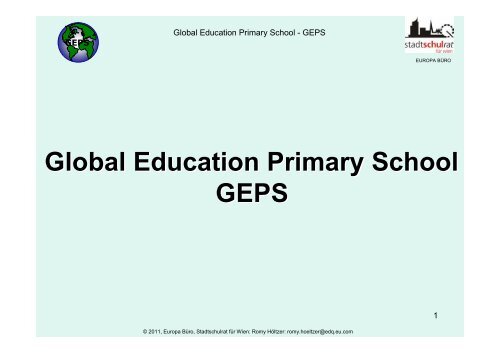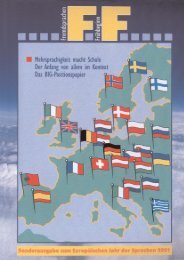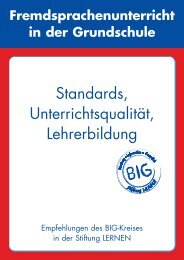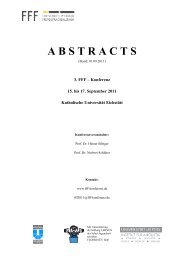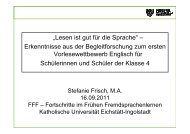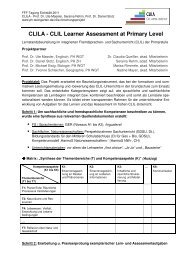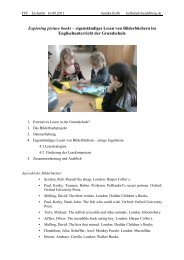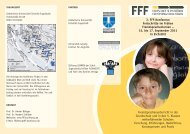Projektorientiertes Lernen - FFF-Konferenz
Projektorientiertes Lernen - FFF-Konferenz
Projektorientiertes Lernen - FFF-Konferenz
Create successful ePaper yourself
Turn your PDF publications into a flip-book with our unique Google optimized e-Paper software.
GEPS<br />
Global Education Primary School - GEPS<br />
© 2011, Europa Büro, Stadtschulrat für Wien: Romy Höltzer: romy.hoeltzer@edq.eu.com<br />
EUROPA BÜRO<br />
Global Education Primary School<br />
GEPS<br />
1
GEPS<br />
Global Education Primary School - GEPS<br />
© 2011, Europa Büro, Stadtschulrat für Wien: Romy Höltzer: romy.hoeltzer@edq.eu.com<br />
EUROPA BÜRO<br />
2
GEPS<br />
Hintergrund<br />
Global Education Primary School - GEPS<br />
Entwicklung zur Weltgesellschaft - Globalisierung<br />
Sich daraus ergebende Lernherausforderungen<br />
© 2011, Europa Büro, Stadtschulrat für Wien: Romy Höltzer: romy.hoeltzer@edq.eu.com<br />
EUROPA BÜRO<br />
3
GEPS<br />
Komponenten<br />
Globales <strong>Lernen</strong><br />
Fremdsprachenkompetenz<br />
Global Education Primary School - GEPS<br />
© 2011, Europa Büro, Stadtschulrat für Wien: Romy Höltzer: romy.hoeltzer@edq.eu.com<br />
EUROPA BÜRO<br />
Medienkompetenz - Umgang mit modernen Informationsund<br />
Kommunikationstechnologien (IKT)<br />
<strong>Projektorientiertes</strong> <strong>Lernen</strong><br />
4
GEPS<br />
Globales <strong>Lernen</strong><br />
Definitionen<br />
Global Education Primary School - GEPS<br />
„Global Education is education that opens people´s eyes and<br />
minds to the realities of the world and awakens them to bring<br />
about a world of greater justies, equity and human rights for<br />
all.“<br />
KoordinatorInnen der Global Education Week Europe<br />
„A global citizen is aware of the wider world and has a sense of<br />
his/her own role as a world citizen; respects and values diversity; is<br />
willing to act to make the world a more equitable and sustainable<br />
place; takes responsibility for his/her actions.“<br />
Projekt „Education for Global Citizenship“<br />
© 2011, Europa Büro, Stadtschulrat für Wien: Romy Höltzer: romy.hoeltzer@edq.eu.com<br />
EUROPA BÜRO<br />
5
GEPS<br />
Globales <strong>Lernen</strong><br />
Facetten<br />
Politische Bildung<br />
Friedenspädagogik<br />
Menschenrechtsbildung<br />
Umweltpädagogik<br />
Interkulturelles <strong>Lernen</strong><br />
Soziales <strong>Lernen</strong>, etc.<br />
Global Education Primary School - GEPS<br />
© 2011, Europa Büro, Stadtschulrat für Wien: Romy Höltzer: romy.hoeltzer@edq.eu.com<br />
EUROPA BÜRO<br />
6
GEPS<br />
Globales <strong>Lernen</strong><br />
Schlüsselkompetenzen<br />
Sachkompetenz<br />
(Wissen, Verstehen, Urteilen)<br />
Global Education Primary School - GEPS<br />
Methodenkompetenz<br />
(Planen, Erforschen, Nachschlagen, Organisieren, Gestalten, Evaluieren)<br />
Sozialkompetenz<br />
(kommunikative Kompetenz, Kooperations- und Teamfähigkeit,<br />
Kompromissbereitschaft, Konfliktfähigkeit, Rücksicht)<br />
Selbstkompetenz<br />
(Selbstvertrauen, Neugierde, Lernbereitschaft, Initiative, Selbstreflexion,<br />
Bereitschaft zum Perspektivenwechsel<br />
© 2011, Europa Büro, Stadtschulrat für Wien: Romy Höltzer: romy.hoeltzer@edq.eu.com<br />
EUROPA BÜRO<br />
7
GEPS<br />
Globales <strong>Lernen</strong><br />
Themen<br />
Global Education Primary School - GEPS<br />
Unsere Klasse hat viele Gesichter<br />
Sprachen in unserer Klasse<br />
Schulalltag in anderen Ländern<br />
Wie spielen Kinder bei uns und anderswo<br />
Tagesablauf von Kindern in anderen Ländern<br />
Feste bei uns und in anderen Ländern<br />
Hunger tut weh<br />
„Faire“ Kleidung<br />
Die Welt deckt uns den Tisch<br />
Faitrade-Fairpay<br />
Kinderarbeit und Kinderrechte weltweit<br />
Reime, Lieder, Tänze, Musik, Märchen, Geschichten aus aller Welt<br />
© 2011, Europa Büro, Stadtschulrat für Wien: Romy Höltzer: romy.hoeltzer@edq.eu.com<br />
EUROPA BÜRO<br />
8
GEPS<br />
Globales <strong>Lernen</strong><br />
Methoden<br />
Interkulturelles <strong>Lernen</strong><br />
Soziales <strong>Lernen</strong><br />
Ganzheitliches <strong>Lernen</strong><br />
Handlungsorientiertes <strong>Lernen</strong><br />
Eigenverantwortliches <strong>Lernen</strong><br />
Exemplarisches <strong>Lernen</strong><br />
Multiperspektivisches <strong>Lernen</strong><br />
Fächerübergreifendes <strong>Lernen</strong><br />
<strong>Projektorientiertes</strong> <strong>Lernen</strong>, etc.<br />
Global Education Primary School - GEPS<br />
© 2011, Europa Büro, Stadtschulrat für Wien: Romy Höltzer: romy.hoeltzer@edq.eu.com<br />
EUROPA BÜRO<br />
9
GEPS<br />
Global Education Primary School - GEPS<br />
Fremdsprachenkompetenz<br />
Englisch<br />
CLIL - Englisch als Arbeitssprache<br />
Ab der ersten Schulstufe<br />
Auch zur Vermittlung von Inhalten des Globalen <strong>Lernen</strong>s<br />
1 Stunde pro Tag<br />
Native Speaker Teacher<br />
Team-Teaching mit KlassenlehrerIn<br />
Andere Sprachen<br />
Einführung einer zweiten Fremdsprache<br />
Ab der dritten Schulstufe<br />
Abhängig von LehrerInnenkapazität<br />
© 2011, Europa Büro, Stadtschulrat für Wien: Romy Höltzer: romy.hoeltzer@edq.eu.com<br />
EUROPA BÜRO<br />
10
GEPS<br />
Medienkompetenz<br />
Global Education Primary School - GEPS<br />
<strong>Lernen</strong>, Festigen, Erweitern des Umgangs mit der Technologie<br />
Spielerischer Umgang zum Erwerben, Wiederholen und Festigen<br />
von Unterrichtsinhalten<br />
Informationssuche<br />
Kommunikation<br />
Erzeugen, Gestalten, Präsentieren von Texten und Dokumenten<br />
© 2011, Europa Büro, Stadtschulrat für Wien: Romy Höltzer: romy.hoeltzer@edq.eu.com<br />
EUROPA BÜRO<br />
Anbahnen der Entwicklung von (kritischen) Einstellungen und<br />
Haltungen gegenüber Anwendung, Einsatz und Auswirkung von<br />
IKT auf das persönliche Leben als auch auf unsere Welt (Computer<br />
als Werkzeug)<br />
11
GEPS<br />
Global Education Primary School - GEPS<br />
<strong>Projektorientiertes</strong> <strong>Lernen</strong><br />
Klassenprojekte<br />
Schulprojekte<br />
Jahresprojekte<br />
Internationale Projekte<br />
© 2011, Europa Büro, Stadtschulrat für Wien: Romy Höltzer: romy.hoeltzer@edq.eu.com<br />
EUROPA BÜRO<br />
12
GEPS<br />
Global Education Primary School - GEPS<br />
<strong>Projektorientiertes</strong> <strong>Lernen</strong> - Beispiele<br />
The cat and its relatives<br />
1.Schulstufe; 3 Wochen<br />
Where do we find cats on the globe? - Tigers in Asia, lions in Africa,<br />
jaguars in South America<br />
We had a few lessons sitting in a circle around an inflatable globe<br />
searching the continents. A painting lesson in English introducing<br />
new vocabulary: tail, whiskers, .. (repeating parts of the body)<br />
An excursion to the zoo<br />
© 2011, Europa Büro, Stadtschulrat für Wien: Romy Höltzer: romy.hoeltzer@edq.eu.com<br />
EUROPA BÜRO<br />
13
GEPS<br />
Global Education Primary School - GEPS<br />
© 2011, Europa Büro, Stadtschulrat für Wien: Romy Höltzer: romy.hoeltzer@edq.eu.com<br />
EUROPA BÜRO<br />
14
GEPS<br />
Global Education Primary School - GEPS<br />
<strong>Projektorientiertes</strong> <strong>Lernen</strong> - Beispiele<br />
Picasso - Peace - Freedom<br />
2.und 3. Schulstufe; 3 Wochen<br />
The project was started in the Albertina, visiting an exhibition with the<br />
title ‚Picasso-Frieden-Freiheit’.<br />
There the children got a lot of info - first of all about the person Pablo<br />
Picasso and his engagement in peace (‚Friedensbewegung’) at a<br />
time when Spain was engaged in the Spanish Civil War ‚Bürgerkrieg’<br />
and Spaniard fought against Spaniard.<br />
His symbol for peace was the white dove and he used it in many<br />
different artistic styles and situations.<br />
© 2011, Europa Büro, Stadtschulrat für Wien: Romy Höltzer: romy.hoeltzer@edq.eu.com<br />
EUROPA BÜRO<br />
15
GEPS<br />
Global Education Primary School - GEPS<br />
<strong>Projektorientiertes</strong> <strong>Lernen</strong> - Beispiele<br />
Picasso - Peace - Freedom<br />
Also in the classroom the class engaged in ‚freedom’ and freedom symbols in<br />
many ways:<br />
- Searching for freedom symbols and creating their own symbols<br />
- Speaking about freedom and the possibilities of resolving conflicts<br />
- Writing stories concerning peace in the classroom and peace in our<br />
surroundings<br />
- Reading relevant stories and books<br />
- Painting freedom pictures<br />
- Creating freedom doves from different materials<br />
- Creating jewellery out of clay and paper maché<br />
- Translating the terms ‚freedom’ and ‚peace’ in all the languages the children<br />
in class speak and also in many others; noticing thoughts, associations and<br />
ideas with these regards<br />
- Composing a small theatre piece<br />
- Singing freedom songs, e.g. ‚All You Need Is Love’ ‚Give Peace a Chance’<br />
(Beatles) and a Jewish/Arabic peace-song ,Hevenu Shalom Aleichem.<br />
© 2011, Europa Büro, Stadtschulrat für Wien: Romy Höltzer: romy.hoeltzer@edq.eu.com<br />
EUROPA BÜRO<br />
16
GEPS<br />
Global Education Primary School - GEPS<br />
<strong>Projektorientiertes</strong> <strong>Lernen</strong> - Beispiele<br />
Afrikafest<br />
3.Schulstufe<br />
Begrüßung<br />
Fahnenträger (Länderaufzählung)<br />
Buchstaben vortragen (Beamer Projektion)<br />
A F R I C A<br />
Jambo (Teil Kisuaheli, Teil Englisch)<br />
(CD: „African Playground“)<br />
In the Jungle (song)<br />
Handas Surprise (Theaterstück nach dem Kinderbuch „Handas Surprise“)<br />
Days of the week (aus dem Buch von Eric Carle „Today is Monday“)<br />
Utuki (afrikanisches Kreisspiel)<br />
© 2011, Europa Büro, Stadtschulrat für Wien: Romy Höltzer: romy.hoeltzer@edq.eu.com<br />
EUROPA BÜRO<br />
17
GEPS<br />
Global Education Primary School - GEPS<br />
<strong>Projektorientiertes</strong> <strong>Lernen</strong> - Beispiele<br />
Afrikafest<br />
Spendenaufruf : Wasser für Afrika: Childcare Africa<br />
(Nachhaltigkeit: Während des Jahres wurde auch die Problematik<br />
der Wasserversorgung auf dem ganzen Kontinent aufgezeigt.<br />
Daraus resultierte der Wunsch etwas zu bewirken.)<br />
Kalimba<br />
(CD: „African Playground“)<br />
We’re going west,<br />
We’re going south, …<br />
(Festigen der Himmelsrichtungen)<br />
© 2011, Europa Büro, Stadtschulrat für Wien: Romy Höltzer: romy.hoeltzer@edq.eu.com<br />
EUROPA BÜRO<br />
18
GEPS<br />
Global Education Primary School - GEPS<br />
<strong>Projektorientiertes</strong> <strong>Lernen</strong> - Beispiele<br />
Afrikafest<br />
Vorbereitende Aufgaben:<br />
Einkaufen auf dem Nachmarkt mit Native Speaker Teacher:<br />
Vorher wird eine Shopping List mit Früchten aus dem Theaterstück<br />
(3 mangos, 2 pineapples, …) geschrieben. Die Früchte werden auf<br />
dem Markt gekauft, wobei die englische Sprache verwendet wird.<br />
Verkosten in der Klasse:<br />
Vokabel werden wiederholt: plate, knife, taste, …<br />
I like the sweet passion fruit…<br />
Einstudieren aller Texte<br />
Reflexion:<br />
Eindrücke werden im „All about me“ book der 3. Klasse festgehalten:<br />
Our Africa Project (I liked Handas Surprise. I liked the songs. I liked<br />
the teachers…)<br />
© 2011, Europa Büro, Stadtschulrat für Wien: Romy Höltzer: romy.hoeltzer@edq.eu.com<br />
EUROPA BÜRO<br />
19
GEPS<br />
Global Education Primary School - GEPS<br />
© 2011, Europa Büro, Stadtschulrat für Wien: Romy Höltzer: romy.hoeltzer@edq.eu.com<br />
EUROPA BÜRO<br />
20
GEPS<br />
Global Education Primary School - GEPS<br />
<strong>Projektorientiertes</strong> <strong>Lernen</strong> - Beispiele<br />
If the World Were a Village<br />
4.Schulstufe; 4 Wochen<br />
Focusing on the popular book “If the World Were a Village”, by David<br />
J. Smith and Shelagh Armstrong.<br />
The idea of the book is this:<br />
There are over 6.7 billion people living on earth, a number impossible<br />
to visualize, especially for children. However, in Smith’s book, he<br />
asks the reader to imagine the whole world population as a village of<br />
100, with each person representing 67 million people.<br />
© 2011, Europa Büro, Stadtschulrat für Wien: Romy Höltzer: romy.hoeltzer@edq.eu.com<br />
EUROPA BÜRO<br />
21
GEPS<br />
Global Education Primary School - GEPS<br />
<strong>Projektorientiertes</strong> <strong>Lernen</strong> - Beispiele<br />
If the World Were a Village<br />
So, of the 100 people in the global village<br />
61 are from Asia<br />
13 are from Africa<br />
12 are from Europe<br />
8 are from South and Central America<br />
5 are from the USA and Canada<br />
1 is from Oceania<br />
Phase 1:<br />
Before working through the chapters of the book, the class did a group mural<br />
project of the world and painted a small village on the top to represent their<br />
village of 100.<br />
Next, everyone brought empty toilet paper rolls to school and using various<br />
materials, 100 diverse “villagers” were made from the empty rolls. These were<br />
used throughout the course of the project when the class was working with<br />
the floor map and wanted to depict visually how the village population was<br />
dispersed. (I have a large Peter’s Projection floor map which I made.)<br />
© 2011, Europa Büro, Stadtschulrat für Wien: Romy Höltzer: romy.hoeltzer@edq.eu.com<br />
EUROPA BÜRO<br />
22
GEPS<br />
Global Education Primary School - GEPS<br />
<strong>Projektorientiertes</strong> <strong>Lernen</strong> - Beispiele<br />
If the World Were a Village<br />
Phase 2:<br />
The book contains the following chapters:<br />
Nationalities, languages, ages, religions, food, air and water,<br />
schooling/literacy, money/possessions, electricity, the village in the<br />
past, the village in the future.<br />
Several class periods were spent discussing each chapter (except<br />
the final two), using supplementary material/handouts from various<br />
sources as support, including the books The Hungry Planet and<br />
Material World, both by Peter Menzel.<br />
The accompanying DVD, which is beautifully produced and has<br />
English subtitles, was viewed, using a laptop/beamer in the<br />
classroom.<br />
© 2011, Europa Büro, Stadtschulrat für Wien: Romy Höltzer: romy.hoeltzer@edq.eu.com<br />
EUROPA BÜRO<br />
23
GEPS<br />
Global Education Primary School - GEPS<br />
© 2011, Europa Büro, Stadtschulrat für Wien: Romy Höltzer: romy.hoeltzer@edq.eu.com<br />
EUROPA BÜRO<br />
24
GEPS<br />
Global Education Primary School - GEPS<br />
<strong>Projektorientiertes</strong> <strong>Lernen</strong> - Beispiele<br />
Royal Wedding Day<br />
Ganze Schule; 29.04.2011<br />
Prior to the day the children had made royal bunting and flags.<br />
We talked about the royal family and the wedding of William and Kate.<br />
Using the calendar we had a count down to the big day.<br />
Axel and myself dressed as the royal couple and at 10:00 we walked<br />
through the school. The children sang a verse of the national anthem and<br />
Axel gave a short speech. We visited each classroom and handed out a<br />
favor of candy to the children. Each class ate cake for their break.<br />
A very memorable day for all!<br />
© 2011, Europa Büro, Stadtschulrat für Wien: Romy Höltzer: romy.hoeltzer@edq.eu.com<br />
EUROPA BÜRO<br />
25
GEPS<br />
Global Education Primary School - GEPS<br />
© 2011, Europa Büro, Stadtschulrat für Wien: Romy Höltzer: romy.hoeltzer@edq.eu.com<br />
EUROPA BÜRO<br />
26
GEPS<br />
Global Education Primary School - GEPS<br />
<strong>Projektorientiertes</strong> <strong>Lernen</strong> - Beispiele<br />
Animals/The Bear and Other Endangered Species<br />
4.Schulstufe; 3 Wochen<br />
Step 1:<br />
Flashcards to repeat and learn words connected with the topic<br />
animals e.g. tail, tusks, paws, wings, legs, flippers, etc.<br />
Step2<br />
“Statistics” were created out of a choice of animals, how many can<br />
fly, how many can climb, … (movement verbs).<br />
Step 3:<br />
“Mind mapping lesson” – What makes an animal an animal?<br />
Everybody worked on their worksheet, I collected thoughts on the<br />
board (can hear, can move, eat, make noise, need space, give birth,<br />
die, ..)<br />
© 2011, Europa Büro, Stadtschulrat für Wien: Romy Höltzer: romy.hoeltzer@edq.eu.com<br />
EUROPA BÜRO<br />
27
GEPS<br />
Global Education Primary School - GEPS<br />
<strong>Projektorientiertes</strong> <strong>Lernen</strong> - Beispiele<br />
Animals/The Bear and Other Endangered Species<br />
Step 4:<br />
Copies from enchanted learning website: loggerhead turtle, African<br />
elephant, polar bear, …New vocabularies in our vocabulary books<br />
Step 5:<br />
We decided collectively in class to pick the bear as our special topic.<br />
A project title was created: The bear and other endangered species.<br />
Step 6:<br />
Excursion to the Schönbrunn Zoo – We enjoyed the guided tour.<br />
Topic: Bears<br />
Step7:<br />
WWF was invited to the class. Topic: Brown bears in Europe<br />
© 2011, Europa Büro, Stadtschulrat für Wien: Romy Höltzer: romy.hoeltzer@edq.eu.com<br />
EUROPA BÜRO<br />
28
GEPS<br />
Global Education Primary School - GEPS<br />
<strong>Projektorientiertes</strong> <strong>Lernen</strong> - Beispiele<br />
Animals/The Bear and Other Endangered Species<br />
Step 8:<br />
Pupils worked on the computers to get more information on the<br />
animal they had chosen<br />
Step 9:<br />
Pupils created beautiful posters<br />
Step 10:<br />
We invited an artist to our handicraft lesson, who explained some<br />
tricks working with clay<br />
Step 11:<br />
We collected pictures and sheets in a folder<br />
Step 12:<br />
Parents and other classes were invited to the school exhibition<br />
© 2011, Europa Büro, Stadtschulrat für Wien: Romy Höltzer: romy.hoeltzer@edq.eu.com<br />
EUROPA BÜRO<br />
29
GEPS<br />
Global Education Primary School - GEPS<br />
© 2011, Europa Büro, Stadtschulrat für Wien: Romy Höltzer: romy.hoeltzer@edq.eu.com<br />
EUROPA BÜRO<br />
30
GEPS<br />
Global Education Primary School - GEPS<br />
<strong>Projektorientiertes</strong> <strong>Lernen</strong> - Beispiele<br />
Zeitreise<br />
Ganze Schule; mehrere Wochen<br />
Presentation:<br />
1a:<br />
For their presentation of the project about the Stone Age, the children<br />
learned a sentence or two in English in order to present the posters they<br />
had made. They learned the sentences by heart and recited them when<br />
the parents came.<br />
1b:<br />
Their project was about the Wiener Klassik. The children learned a<br />
lullaby in English that is sung to a tune by Mozart and they sung this for<br />
their presentation. We had also discussed clothing during this period and<br />
they coloured pictures of the clothes and used them as decoration.<br />
© 2011, Europa Büro, Stadtschulrat für Wien: Romy Höltzer: romy.hoeltzer@edq.eu.com<br />
EUROPA BÜRO<br />
31
GEPS<br />
Global Education Primary School - GEPS<br />
<strong>Projektorientiertes</strong> <strong>Lernen</strong> - Beispiele<br />
Zeitreise<br />
2a:<br />
This project was about the Vikings. In English, we learned about Viking<br />
longships and the voyages to Iceland, Greenland and North America. We<br />
learned various Viking words and the children wrote the English words<br />
and drew pictures to match them. We learned about Viking mythology and<br />
presented one of the sagas with the play “A Night in the Forest”. Six<br />
children were actors, the rest were narrators. We also sang the song<br />
“Viking Warriors are We”.<br />
2b:<br />
The project was about the Wild West. The children learned roles in a<br />
short play about Pecos Bill, a cowboy, which they presented for the<br />
presentation. Each child had at least one sentence to say, and the<br />
children whose English was better also had roles to play as the mother,<br />
the father, Pecos Bill and a cowboy.<br />
© 2011, Europa Büro, Stadtschulrat für Wien: Romy Höltzer: romy.hoeltzer@edq.eu.com<br />
EUROPA BÜRO<br />
32
GEPS<br />
Global Education Primary School - GEPS<br />
<strong>Projektorientiertes</strong> <strong>Lernen</strong> - Beispiele<br />
Zeitreise<br />
2c:<br />
Knights and Castles was the topic in this class. The children performed a<br />
play about King Arthur and Excalibur. Twelve children had roles, the<br />
others were narrators. We also learned about the different jobs that<br />
existed in a castle, and each child presented a job by dressing up<br />
accordingly and saying on average 1-3 sentences about it in English.<br />
Each child also coloured a picture of their job and wrote the English which<br />
they presented as well. We also sang a song called “Clapping in the<br />
Castle”.<br />
3a:<br />
The project in this class was about the 19th century. Different inventors<br />
and other famous people from this period were discussed in English. Here<br />
we used simple texts, wordsearches, and curriculum vitae.<br />
For the presentation, Thomas Edison introduced and talked about himself<br />
in English. Also the development of the bicycle was presented in English.<br />
© 2011, Europa Büro, Stadtschulrat für Wien: Romy Höltzer: romy.hoeltzer@edq.eu.com<br />
EUROPA BÜRO<br />
33
GEPS<br />
Global Education Primary School - GEPS<br />
<strong>Projektorientiertes</strong> <strong>Lernen</strong> - Beispiele<br />
Zeitreise<br />
3b:<br />
The project in this class was about the Baroque Era. The children had texts and<br />
wordsearches about composers that we read, and we also wrote a curriculum vitae,<br />
for each composer. For the presentation, two children told about and compared the<br />
lives of Bach and Handel in English.<br />
4a:<br />
This class covered the time period from the big bang up to and including the<br />
dinosaurs (“Reise durch die Erdzeitalter”). In English we talked about<br />
paleontology and about the characteristics of different dinosaurs. The children<br />
made two huge murals, one of a scene from the mesozoic era, and one of a big T.<br />
Rex head. On presentation day, the children sang a rap about dinosaurs and also a<br />
song about the earth (“Water and Land”). We also did a play of the story “The<br />
Dinosaur in Jack’s Garage”. Twenty-one children had roles, several were narrators.<br />
Children provided the props and made signs for the scene changes.<br />
© 2011, Europa Büro, Stadtschulrat für Wien: Romy Höltzer: romy.hoeltzer@edq.eu.com<br />
EUROPA BÜRO<br />
34
GEPS<br />
Global Education Primary School - GEPS<br />
<strong>Projektorientiertes</strong> <strong>Lernen</strong> - Beispiele<br />
Zeitreise<br />
4b:<br />
In this class we travelled back to Ancient Egypt. The children learned<br />
about mummification in detail. Much of the project time they spent<br />
rehearsing a play about apprentices taking a practical test about the<br />
process of mummification. Fourteen children were actors, the others were<br />
narrators and/or made props and signs for the scene changes. The<br />
children also sang a song about mummification (“Let’s make a Mummy”)<br />
and another song about Egypt in general, “Gift of the Nile”. We also talked<br />
about the Gods in Ancient Egypt. In “Song of the Gods”, the main<br />
characteristics of eight of the Gods were presented along with laminated<br />
pictures the children had coloured.<br />
© 2011, Europa Büro, Stadtschulrat für Wien: Romy Höltzer: romy.hoeltzer@edq.eu.com<br />
EUROPA BÜRO<br />
35
GEPS<br />
Global Education Primary School - GEPS<br />
© 2011, Europa Büro, Stadtschulrat für Wien: Romy Höltzer: romy.hoeltzer@edq.eu.com<br />
EUROPA BÜRO<br />
36
GEPS<br />
Guidelines<br />
Global Education Primary School - GEPS<br />
Fremdsprachenkompetenz/Englisch/CLIL<br />
Verbindung:<br />
Englisch als Arbeitssprache/CLIL<br />
Fertigkeitsbereiche GERS (A1+)<br />
Globales <strong>Lernen</strong><br />
Altersspezifisch (Grundstufe I und II)<br />
Themenspezifisch<br />
© 2011, Europa Büro, Stadtschulrat für Wien: Romy Höltzer: romy.hoeltzer@edq.eu.com<br />
EUROPA BÜRO<br />
37
GEPS<br />
GEPS in Wien<br />
2001, GEPS 9., Marktgasse<br />
2002, GEPS 8., Zeltgasse<br />
2002, GEPS 13., Auhofstr.<br />
2002, GEPS 14., Linzer Str.<br />
2004, GEPS 22., Schüttaustr.<br />
Sch ttaustr.<br />
2006, GEPS 11., Braunhuberg.<br />
2006, GEPS 21., Brünner Br nner Str.<br />
2006, GEPS 23., Ant.-Baumg.<br />
Ant. Baumg.-Str. Str.<br />
2007, GEPS 2., Wehlistr.<br />
2007, GEPS 3., Reisnerstr.<br />
2007, GEPS 4., Sankt-Elisabeth<br />
Sankt Elisabeth-Platz Platz<br />
2007, GEPS 4., Schäffergasse<br />
Sch ffergasse<br />
2007, GEPS 12., Deckergasse<br />
2007, GEPS 12., Karl-Löwe Karl we-Gasse Gasse<br />
2007, GEPS 17., Wichtelgasse<br />
Global Education Primary School - GEPS<br />
2009, GEPS 20., Allerheiligenplatz/Vorgartenstraße<br />
Allerheiligenplatz/Vorgartenstra<br />
2011, GEPS 22., Meißnergasse<br />
© 2011, Europa Büro, Stadtschulrat für Wien: Romy Höltzer: romy.hoeltzer@edq.eu.com<br />
EUROPA BÜRO<br />
38
GEPS<br />
Global Education Primary School - GEPS<br />
Weiterführung - Sekundarstufe<br />
Junior High Schools - JHS<br />
Dual Language Programme - DLP<br />
Vienna Bilingual Schools - VBS<br />
© 2011, Europa Büro, Stadtschulrat für Wien: Romy Höltzer: romy.hoeltzer@edq.eu.com<br />
EUROPA BÜRO<br />
39
GEPS<br />
Fortbildung<br />
Pädagogische Hochschule<br />
Ideen- und Materialienbörsen<br />
Global Education Primary School - GEPS<br />
Zusammenarbeit mit der Strategiegruppe Globales <strong>Lernen</strong><br />
© 2011, Europa Büro, Stadtschulrat für Wien: Romy Höltzer: romy.hoeltzer@edq.eu.com<br />
EUROPA BÜRO<br />
40
GEPS<br />
Global Education Primary School - GEPS<br />
Projektkoordination:<br />
Projektkoordination<br />
Dipl. Dipl Pädn. Pädn Romy Höltzer<br />
romy.hoeltzer@edq.eu.com<br />
Stuart Simpson, D.A.<br />
stuart.simpson@ssr-wien.gv.at<br />
stuart.simpson@ssr wien.gv.at<br />
Europa Büro<br />
Stadtschulrat für Wien<br />
Auerspergstr. Auerspergstr.<br />
15/42, A-1080 A 1080 Wien<br />
Tel. (0043 1) 52525 77085, Fax (0043 1) 403 44 27<br />
E-Mail: Mail: www.europabuero.ssr-wien.at<br />
www.europabuero.ssr wien.at<br />
© 2011, Europa Büro, Stadtschulrat für Wien: Romy Höltzer: romy.hoeltzer@edq.eu.com<br />
EUROPA BÜRO<br />
41


